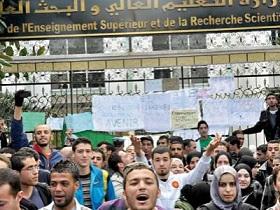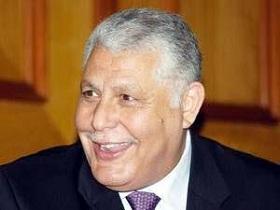Using AI to control energy for indoor agriculture
30 September 2024
Published online 18 February 2011

Protestors at several universities in Algeria are calling for reforms to the university system and the removal of corrupt officials and the resignation of the Minister of Higher Education and Scientific Research.
Tens of students from twenty Algerian universities moved protests to the Algerian Ministry of Higher Education and Scientific Research in Algiers earlier this week. Protestors demanded to meet the government minister to discuss the problems besetting universities for several years.
Minister Rachid Hraoubia, who met representatives of the protesters, promised to address their issues and called for an emergency meeting with university deans on 17 February to form an action plan.
"The ministry promised they will address all issues raised by the students in the next few days," said Ali Boukaroura, dean of Mila University. However, more than 300 students are still camped outside the ministry waiting for tangible changes rather than new promises.
"Algerian universities are in a state of continuous deterioration due to the policies of the ministry which prefers quantity over quality," said Mohamed Bouchekenda, a bioengineer at the University of Constantine, Algeria. "This has negatively affected students and even their supervising professors."
Several students from the University of Bab Ezzouar and University of Algeria spoke to Nature Middle East of their frustration with the education system in Algeria, which seems to be unwilling to invest in new teaching material and better research laboratories and equipment.
"All decisions and actions taken by the ministry so far have been steps backwards, worsening the quality of education," said Othman Touati, a student at the Algerian National School of Public Works.
The problem in Algeria is not simply a matter of funding, adds Bouchekenda. The state is investing around 1.5 billion USD to overhaul education within the next five years. "But without a clear roadmap that emphasizes quality rather than quantity it will be futile."

Official unemployment figures in Algeria linger at 10.2%. However, unemployment among university graduates has hit 23.5%. Students are worried despite several government initiatives to reduce unemployment.
Aicha Bensaad, a professor of modern history at the University Centre of Khemis Miliana, Algeria, compares the situation of Algerian students to that of French students during the May 1968 revolt in Paris or the recent uprisings in Tunisia and Egypt.
Continuing protests in Algeria are a sign that "all is not well," says Algerian sociologist Nacer Djabi. "Unfair distribution of Algeria's wealth, rising graduate unemployment, media censorship and lack of freedoms are some of the main reasons which might lead to general protests at a scale we cannot conceive right now."
Djabi contends that university students and faculty in Algeria play a minimal role in political and social life, despite recent increases in university salaries reaching 60%. "You cannot really depend on them to lead any reform. The university system has been greatly weakened throughout the years by the regime."
doi:10.1038/nmiddleeast.2011.19
Stay connected: